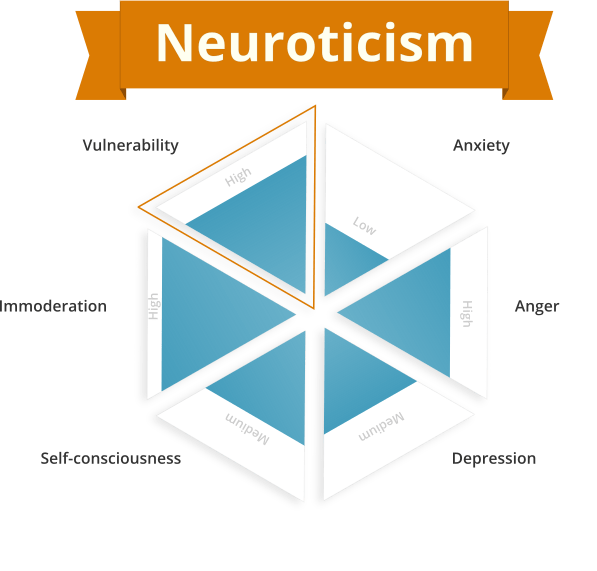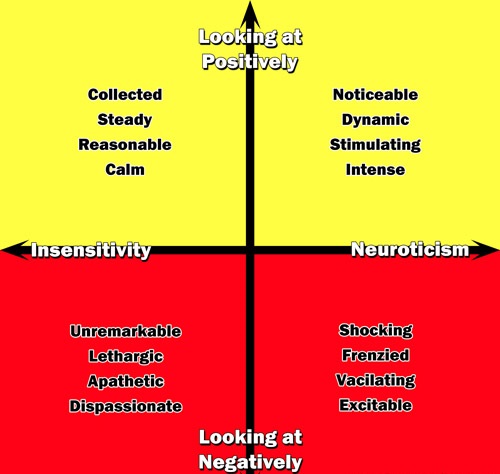Neuroticism is a personality trait that can affect the way you process situations, how you react to events in your life, and your general outlook on life. This article will help answer questions about what neuroticism is, how it manifests itself in different people, and ways to cope with negative emotions.
Contents
What Is Neuroticism?

Neuroticism is a personality trait that is characterized by negative emotions such as anxiety, anger, and depression. People who are neurotic tend to have an increased sensitivity to stressors. Therefore, they are more likely to experience negative emotions in response to events or situations.
What Does It Mean To Be Neurotic?
For some people, neuroticism is simply a personality trait that causes them to experience more negative emotions than others. However, for some people, neuroticism can be debilitating and interfere with their ability to lead a normal life.
How A Neurotic Person Processes A Situation?
When you encounter a stressful event or situation, your brain goes into overdrive as it tries to make sense of what is happening. This can be especially true for people who are neurotic. They may have a harder time dealing with stress and tend to ruminate on negative thoughts more than others.
Neuroticism And Big 5 Personality Traits

Neuroticism is one of the big five personality traits. A person’s neuroticism score reflects their tendency to experience negative emotions, such as anger and anxiety. Neuroticism can vary from low to high. People who are neurotic have a very strong propensity towards experiencing feelings like stress, worry, anxiety. It is their neural wiring that keeps them jittery and fidgety sometimes for no reason.
What Are Signs And Symptoms Of Neurotic Person?

There is no one-size-fits-all answer to this question, as the signs and symptoms of neuroticism will vary from person to person. However, some common signs and symptoms of neuroticism include:
- Experiencing a high level of stress or anxiety in everyday life
- Having trouble controlling emotions
- Excessive worrying
- Feelings of guilt or worthlessness
- Having negative thoughts about the future
- Experiencing frequent mood swings
Factors And Personality Traits That Influence Neuroticism
Factors
Neuroticism is a part of your personality. It can also be used as an indicator of other aspects that are related to your mental health, such as anxiety and depression. Other factors that may influence the level of neuroticism include:
Your genetics
Some people inherit certain genes from their parents which increases the risk of developing bipolar disorder or schizophrenia.
The environment in which you were raised
A person’s childhood can have a lasting effect on their personality and coping skills later in life. For example, if someone grew up with an abusive parent who was neurotic they may be more likely to experience neuroticism themselves.
The brain’s neurochemical makeup
Neuroticism is strongly linked with serotonin, a neurotransmitter that affects mood. People who are highly neurotic tend to have lower levels of serotonin in their brains.
Emotional Stability
Emotionally stable individuals may be able to cope with stressful events more effectively than neurotic people. This can lead them to experience less negative emotion in their life overall.
Personality Traits
Several personality traits can influence neuroticism. These include:
Extroverted people may be more likely to experience negative emotions because they are more stimulated by their environment.
Agreeableness
Agreeable people may be less able to cope with stressors effectively and may be more prone to experiencing negative emotions.
How Do I Know If I’m A Neurotic Person?

If you are wondering whether or not you are a neurotic person, there are a few questions that you can ask yourself.
- First, do you frequently experience negative emotions such as anxiety, anger, and depression?
- Second, do you find it difficult to control your emotions?
- Third, do you tend to worry a lot?
- Fourth, do you have negative thoughts about the future?
- Fifth, are you easily stressed out by everyday situations?
If you answered yes to most of these questions, you might be a neurotic person.
Is Neuroticism A Bad Trait?
Since neuroticism is characterized by negative emotions such as anxiety and depression, it can seem like something that we would want to avoid. However, in some ways, neuroticism can serve an important purpose in our lives:
- Can motivate us to achieve our goals
- Help make us more attentive and detail-oriented
- May increase our creativity
What Are Some Benefits Of Experiencing Negative Emotion?

People who are considered “highly neurotic” are often described in negative terms. They are seen as anxious, stressed-out individuals who let their emotions get the best of them and interfere with their daily lives.
However, there is research that suggests people who experience more intense feelings such as anxiety might be at an advantage when it comes to achieving certain goals. This is because they are more motivated to take action and reach their goals.
In addition, neuroticism has been linked with creativity. People who experience a lot of negative emotions tend to be more creative and come up with new ideas more often than those who do not experience as much negativity.
How To Cope With Neuroticism?
Unfortunately, there is no cure for neuroticism. However, that does not mean that it cannot be managed or treated in some ways. People who are neurotic tend to ruminate and stay focused on negative thoughts more than others. There are no one-size-fits-all methods for coping with neuroticism, but there are some tips that can be helpful:

Take the time to figure out what you’re thinking
When you start to experience negative thoughts, try to take a step back and figure out what is causing them. This can help you address the issue head-on and hopefully reduce the amount of stress that it causes you.
Challenge your negative thoughts
Once you have identified the negative thought, challenge it! Is it really true? What evidence do you have that supports your negative thought? Are there other possible explanations for what is happening around you and the situation at hand?
Find a distraction
Sometimes we need to take our mind off of stressful or upsetting thoughts. Find something positive and distracting like watching a movie, listening to music, spending time with friends, etc.
Take care of yourself
It is important to remember that you have needs just like everyone else. Try taking care of yourself by eating well, exercising regularly, sleeping enough hours at night, etc.
Find ways to appreciate what you do have
Feeling grateful for the things around us can help us reduce feelings of stress and anxiety in our life. Focus on what you are grateful for and take time each day to reflect on these things.
NOTE: If none of these suggestions work, consider trying a new form of therapy or medication. Remember, neurotic tendencies do not have to interfere with your life and happiness!
Does Neuroticism Decrease With Age?
Some people believe that neuroticism decreases with age, while others think it remains the same.
There is research to suggest both of these ideas may be true: some neurotic tendencies such as pessimism and worry do decrease after a certain point in time.
While other tendencies like anger and stress tend to stay at about the same level over our lifespan.
It is important to note that neuroticism tends to decline as we age. But it does not disappear completely and can still cause problems in some cases.
Professionals’ View On Neuroticism
The Diagnostic And Statistical Manual of Mental Disorders (DSM-IV) refers to neuroticism as one of the five traits that make up a person’s personality, along with extraversion, openness, agreeableness, and conscientiousness.
There is no specific treatment or medication for neuroticism, but many professionals suggest cognitive behavioral therapy to address the issue and help people cope with it better.
Therapy can also be used as a tool for identifying negative thought patterns that contribute to feelings of stress and anxiety.
There is a lot of research that has been done on neuroticism and the professionals who have studied it tend to have some interesting things to say about this personality trait.
The Positives
Neuroticism can be a motivating factor in people’s lives, as they are more likely to work hard towards their goals because of how much anxiety and stress they feel.
Neurotics are often more attentive and detail-oriented than others, making them good employees who pay close attention to their work.
The Negatives
People with neuroticism tend to be more emotional and less rational when it comes to decision-making, which can lead to problems in their personal lives and at work
Again, they can be very stressful to work with. As they tend to blow things out of proportion.
Case Study

Jordan B Peterson, a university professor, and clinical psychologist has done some interesting work on neuroticism. According to Dr. Peterson, highly neurotic people tend to engage in what he calls “goal-directed action.” This means that they are very motivated towards their goals and will do whatever it takes to achieve them.
This can be a very good thing, as people who are neurotically motivated tend to work harder than others. However, it can also be harmful because they might take on too much responsibility and worry excessively about the outcome of their actions.
The important takeaway from Dr. Peterson’s research is that neurotic individuals should focus their energy towards goals that are in line with their fundamental values. This will allow them to be productive without worrying too much about the result of what they’re doing.
Talking To A Professional About Neuroticism
If none of these suggestions work, consider trying a new form of therapy or medication. Many professionals can provide you with information and support when it comes to neuroticism. Some of these professionals include:
- Psychologists
- Counselors
- Therapists
- Psychiatrists
Psychiatrists and psychologists, often, these individuals help their patients work on techniques for coping with their neurotic tendencies.
Social workers can help individuals work on improving relationships and increasing social support to cope with the negative emotions associated with neuroticism.
NOTE: If you are experiencing a lot of anxiety, stress, or negative emotions, talking to one of these professionals can be very helpful. They will be able to provide you with support and guidance and can help you find ways to cope with your neuroticism.
Therapy Options For Neuroticism
There are many different therapy options for neuroticism including:
Cognitive Behavioral Therapy (CBT)
A type of therapy that focuses on the relationships between your thoughts, behaviors, and emotions.
Dialectical Behavioral Therapy (DBT)
A form of CBT where patients learn how to better understand their values as well as those held by other people to cope with difficult situations or emotions.
Mindfulness-Based Cognitive Therapy (MBCT)
A treatment option for depression that focuses on learning how to live in the moment without letting your thoughts control your actions or emotions; through mindfulness, you will be able to better cope with stressful situations.
Psychodynamic Psychotherapy
An option for individuals who are looking to heal emotionally painful experiences from their past. A therapist will help you understand how these events have affected you in the present day so that you can better cope with them.
Psychoanalytic Psychotherapy
A type of psychodynamic therapy that helps people understand how their unconscious thoughts and feelings are affecting them in daily life. By becoming aware of these underlying problems, you can begin to address your issues with the help of a therapist.
Neuropsychology
A form of therapy that focuses on the relationship between your brain and your thoughts, behaviors, emotions, and memories.
Interpersonal Psychotherapy
A treatment option designed to help people identify and solve interpersonal problems that are causing their distress.
NOTE: Each of these therapies has its benefits, so you should consider which one is best for you. If none of these options work, consider trying another form of therapy or medication.
Conclusion
Neuroticism is a term that describes a personality trait in which a person experiences high levels of stress or anxiety. Neuroticism is often associated with negative emotions such as anger, depression, and worry. While it can be seen as a negative trait, neuroticism can serve an important purpose in some ways.
People who experience a lot of negativity tend to be more motivated and creative when it comes to achieving their goals. In addition, they often have stronger social support networks than those who do not experience as much anxiety or stress regularly.
Unfortunately, there is no cure for neuroticism, but there are ways to cope with it. If you are experiencing a lot of anxiety or stress, talking to a professional can be very helpful.
If you are looking for affordable Online Counseling MantraCare can help: Book a trial therapy session


